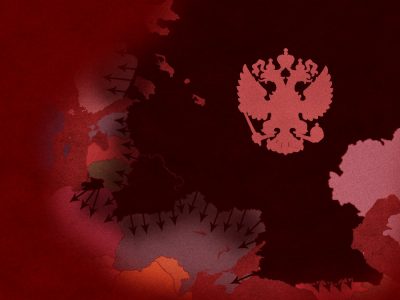To understand Russian President Vladimir Putin’s invasion of the sovereign state of Ukraine is to understand Putin’s views on himself, the history of Russia and the politics in contemporary Europe today.
Unfortunately, Putin has a warped reality when it comes to Ukrainian history, and he has a false understanding of the sovereignty the former Soviet states recognize.
According to Putin, the collapse of the USSR was a tragic mistake, and the West unethically stole land from the Soviet Union. During a speech on Feb. 21, Putin said: “The disintegration of our united country was brought about by the historic, strategic mistakes on the part of Bolshevik and Soviet leaders … the collapse of the historical Russia known as the USSR is on their conscience.”
Putin views himself as a champion of the former USSR, and his aspirations for Russia’s future are to reclaim the land that the Soviet Union lost after its collapse in December 1991. That land now belongs to countries like Latvia, Ukraine and Estonia, among others.
“Ukraine is not just a neighboring country for us. It is an inalienable part of our own history, culture and spiritual space,” he said in his speech. What we call Ukraine today “was entirely created by Russia or, to be more precise, by Bolshevik Communist Russia.”

The former KGB agent feels personally threatened by Ukraine’s existence because it demonstrates to the Russian people that Putin’s autocratic dictatorship is not the only option for post-Soviet states, but also because it challenges Putin’s personal and warped ideology that a pro-European, anti-Russian, democratically functioning former Soviet state is possible and can flourish.
Beyond the fears Putin has about what Ukraine represents in an idealistic way, he also fears the threat Ukraine poses as a NATO or European Union member state. Having one of your closest neighbors aligned so deeply with some of your worst adversaries, is something Putin wants to avoid at all costs.
Ukraine’s existence has challenged Putin for the last decade and it is for these reasons why he chose to invade Ukraine.
Putin’s unfortunate ideology is likely why he underestimated Ukrainian resistance to a Russian invasion, causing thousands of Russian military casualties and a slower-than-expected conquest of a neighboring country. He did not predict the scope of the pro-Ukrainian nationalist sentiment that many Ukrainians hold.
The Russian president additionally underestimated the scale of the sanctions that the West enacted in light of the invasion. The more than 5,000 sanctions aimed to hurt Russia’s tanking economy are forcing the ruble’s value close to worthless.
While Russia has taken economic steps to mitigate the sanctions from the West, like banning ruble loans to certain foreigners, Russia’s economy is still failing.
Some experts, like Russian economist Sergei Guriev, argue that a recession is looming, with the ruble now worth less than one US cent. “There will be recession and lower quality of life. And in that sense, I feel sad as an economist,” Guriev said during an interview with the National Public News Radio.
Though Putin knows his economy is suffering due to his invasion, he cannot and will not stop.
This is for two primary reasons.
The first reason is that if his invasion fails, Putin will look weak to his country. His popularity among the politicians who support him might lessen, and he could even lose his presidency and power. This is a no-go option for Putin.
The second reason is that if Putin fails to invade a smaller and supposedly weaker state, it will hurt Russia’s reputation as a significant world power. Putin cannot afford to look weaker when Europe’s influence is literally and figuratively at Russia’s door.
If Putin’s invasion is successful, it will set a dangerous precedent for future nations. The situation with Russia and Ukraine looks eerily similar to that of China and Taiwan, where China claims Taiwan, a democratic and self-governing country, is part of its territory.
Since Russia’s invasion, Taiwan has directed its military to be on high alert for a potential conflict instigated by China, where a different authoritarian leader, President Xi Jinping, has been pushing conflict in the region for the last decade.
All that being said, in the aftermath of the Russia-Ukraine war, the world should be less surprised if, one day, China decides to invade Taiwan.





















































































































